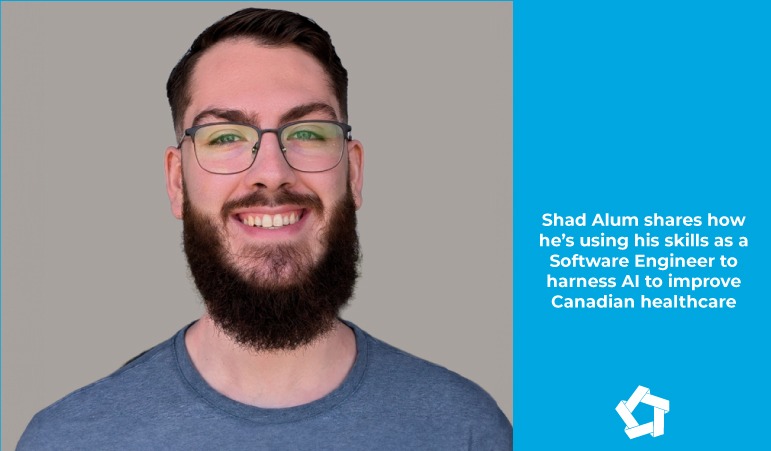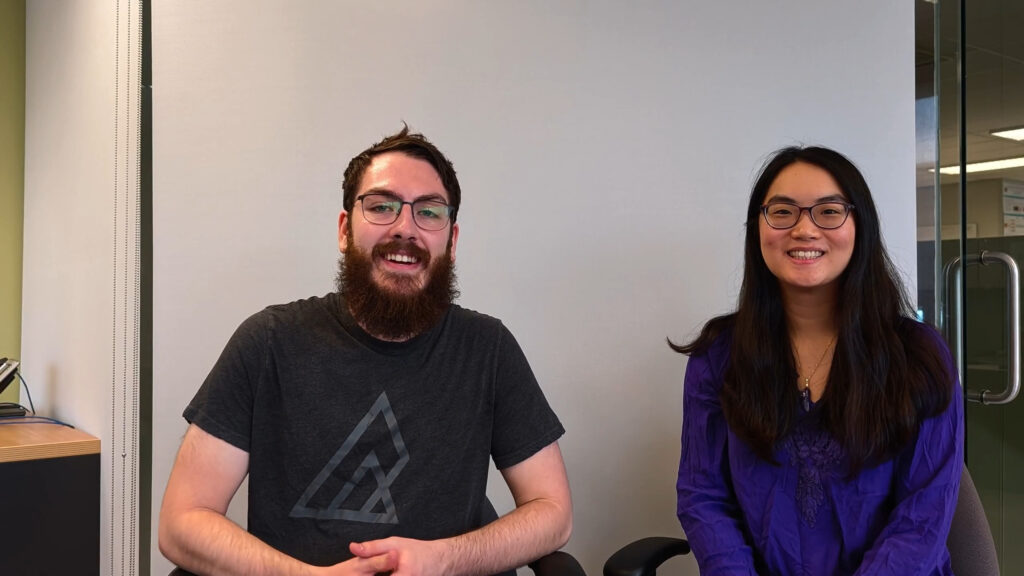
Shad Alum shares how he’s using his skills as a Software Engineer to harness AI to improve Canadian healthcare
When Michel Bourgeois was diagnosed with an incurable health condition, he experienced firsthand the shortcomings of the country’s overextended healthcare system. Rather than accept the status quo, he saw an opportunity to put his skills as a software engineer to work and created Delphi, an AI powered healthcare tool that streamlines the diagnostic and referral process, greatly expediting the time it takes for patients to see a resolution to their medical concerns.
“It took me two years to go through the Canadian healthcare system and get a diagnosis and treatment plan because I kept getting bounced around from specialist to specialist, waiting six months in between to see each one. I realized there is so much time wasted unnecessarily in our current process, and I wanted to create something to plug that gap.”

Seeing innovation and technology as a means of solving real-world problems is a lesson Michel took away from his time at Shad in the summer of 2016. Introduced to other highly motivated students and STEAM field experts, Michel learned how knowledge and shared goals together create a powerful force for progress.
“Shad is a values-based program. It really helped me to zone in on what my values are and how to use those principles to have an impact. The biggest thing that I got out of Shad and that really stuck with me is that I wanted to contribute to human flourishing and well-being through my career choice and any expertise I gained.”

When Michel arrived at Shad’s University of New Brunswick (UNB) campus, he had already developed a deep interest in digital technologies and the mechanics that underpinned their development. He loved video games and the software code that brought them to life, and he hoped to pursue a career in the field and put his passion into practice.
“When I was six years old, I thought I was going to make video games and started to learn programming around age 12 in service of that goal. I kept learning programming until I was in 11th, 12th grade, and so when it came time to apply for university, it was just kind of a no brainer that I would apply for computer science or software engineering.”

Having mostly moved on from his goal of designing video games, Michel arrived at the University of Waterloo eager to learn and explore the different professional pathways the Software Engineering program opened up for him. He knew he wanted to do something meaningful with is skills and so sought to find a path that afforded him that opportunity.
“My first co-op experience was with Hypercare, a healthcare technology that provides solutions for improved clinical communication and collaboration, while it was in an earlier stage of startup. They had a back-end developer on their team when I joined, but a week into my internship, the back-end developer quit to go work another job, which meant I would be the only back-end developer on the team. So, I did a lot of stuff, a lot of work. I got a lot of valuable experience through that co-op.”
Though he had a chance to experience a number of workplace internships after that, the experience at Hypercare had a lasting impact on Michel. It provided him insight into how a startup is built and what goes into the business side of building a software product. So, when his experience with the healthcare system set him on a mission to find a solution to lengthy wait times, he felt confident in his ability to build something from scratch.

“My first internship definitely taught me that, yes, I can handle heading my own startup. That confidence has been important because in building Delphi, I’ve had to do a lot of the software engineering stuff on my own because we’re small and all of the software building work falls on myself and my co-founder.”
He also credits Shad for helping him to build a mindset around entrepreneurship that helped him see it as an accessible and attainable option for problem solving.
“The Design Project at Shad really shows students how entrepreneurship can be used to solve problems. It has a big overarching theme and encourages students to think about a problem from multiple perspectives to really understand it before going into building a solution and prototype using a business proposal. It draws a throughline between problem-solving and business.”

At Shad, Michel also learned the importance of having a network of talented, supportive people around you, so when he decided he wanted to develop a technology to help solve a major impediment to efficient healthcare in Canada, he tapped a partner he knew would bring valuable skills to the project to help make it the best it could be.
“My co-founder is a PhD student in Management Engineering at UW. We met at Velocity, an entrepreneurship incubator at the university, so our relationship was built on our shared desire to start a business. She was doing her Master’s in AI and healthcare when I reached out to her, so I knew that she had the expertise in AI and healthcare. And I knew who she was, I knew what her values were, so I knew we’d work well together.”
Together they built Delphi, a healthcare app that uses an AI doctor whose diagnoses are supervised by a human doctor.
“Patients can go onto the app and join a session that operates as the initial consultation where they talk with an AI chatbot about their medical issue. The chatbot asks all the questions a doctor would to gather the important information about the medical issue and then generates a summary. At that point, a human doctor joins the chat with that summary in hand with all of the information about the patient’s medical issue. The doctor doesn’t have to spend all that time asking those questions and gathering all that information, which speeds up the doctor’s work. And then on the doctor side, once they give the diagnosis, they have tools to initiate a prescription or other healthcare remedies to the patient quickly and efficiently.”

Michel and his cofounder worked closely with two medical doctors who have consulted on the needs of doctors and how best to develop a tool that meets those needs to effectively address the issue identified.
“The data shows that there’s two causes contributing to the wait time problem in healthcare. As per economists, there’s on the one hand, labor shortage, and on the other end, insufficient productivity. Delphi aims to address that second problem by enhancing the productivity of doctors by reducing the amount of time spent on intake and paperwork so that more time can be put towards resolving patient issues in a timely way.”
The two founders have built a prototype and are currently building it out into a full-fledged solution, testing to ensure it accomplishes the goal of increasing productivity in a way that reflects how medical professionals run a practice.
“Hopefully in the next year or two we’ll have something out, a platform with AI tools integrated for doctor use. We’d love for it to be sooner, but there are always hurdles when introducing new technology into a system to ensure data security and that regulatory requirements are met, which is all a part of the process.”

Michel is optimistic about the success of the app, knowing how important it is to be working towards improving the speed with which Canadians can receive important healthcare services.
“We’re really lucky in this country to have public healthcare. But in order to ensure the system continues we need to be working to improve how it operates and the experience of the people using it. I’m really passionate about the issue and I am committed to helping solve the problem, even if it’s just one part of it. I can’t think of a better use of my skills than preserving a system that’s so important to Canadians.”


